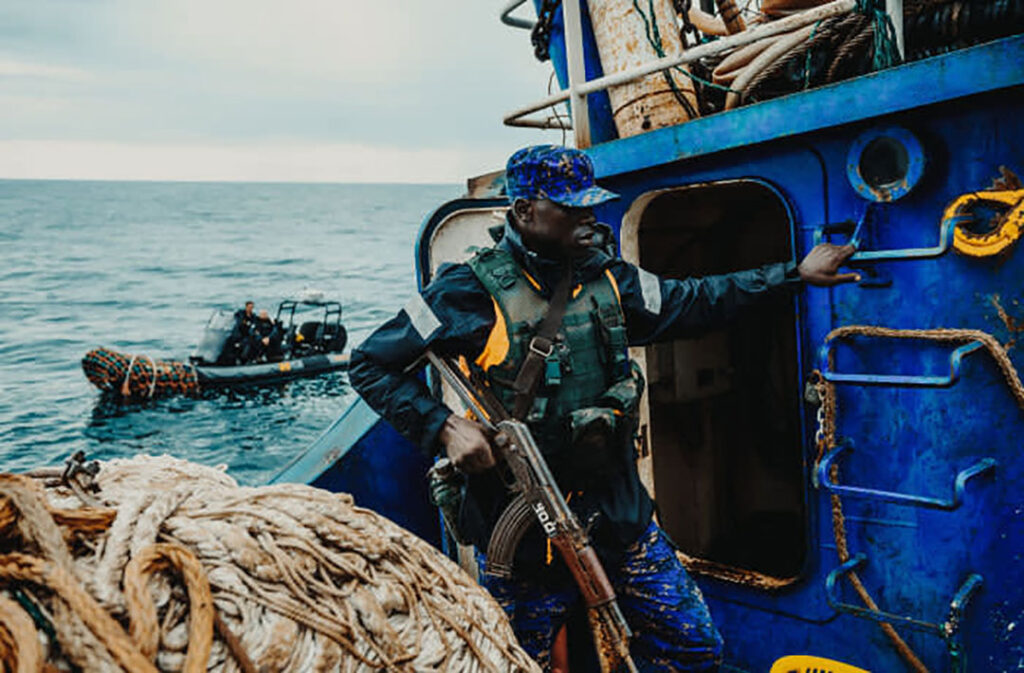ADF STAFF
Foreign trawlers engaged in illegal, unreported and unregulated (IUU) fishing off the West African coast are decimating once-abundant fish populations, devastating local ecosystems and threatening the livelihoods of more than 7 million Africans, many of whose families have relied on artisanal fishing for generations.
It is estimated that IUU fishing and other illegal marine trade could cost West African countries “nearly $1.95 billion across the fish value chain and $593 million per year in lost household income,” according to a recent story in The Africa Report.
The cost of illicit fishing is especially acute for artisanal fishermen in The Gambia, a nation of just over 2.25 million people where more than 200,000 people depend on local fisheries for their livelihoods.
Chinese trawlers are among the worst offenders in West African waters. Peter Hammarstedt, a captain with the nonprofit Sea Shepherd Conservation Society, said there are a couple of ways Chinese boats obtain fishing rights in African countries, which struggle to monitor, control and surveil thousands of kilometers of coastal and intercoastal waterways.
Chinese “fishing vessels are [either] part of the distant water fishing fleet — heavily subsidized by the Chinese government — and pay a fishing license fee; or … the fishing vessels are owned by a national fishing company, [which is] basically a cooperative between Chinese and local business interests,” Hammarstedt told ADF in an email. “In the case of the latter, the fishing vessel is flagged to the African coastal/island state, but the beneficial owner is in China. Either way, they rely on local agents.”
Since Sea Shepherd’s joint operation with the Gambia Navy and Ministry of Fisheries began, authorities have arrested people from 16 illegal trawlers. One of the vessels flew a Chinese flag, and China was the beneficial owner of 11 more. Sea Shepherd also has ongoing operations in Benin, Liberia and Gabon.
Chinese poachers try to avoid penalties for IUU fishing in many ways. They turn off their location transponders; transmit fraudulent location and identifying data; manipulate fishing nets to avoid requirements related to mesh size; threaten or bribe observers at local fisheries; and transfer their catch from one ship to another at sea, beyond the scope of local authorities, Hammarstedt said.
They also “fraudulently declare their fishing capacity on their license applications,” he said. “Since they pay per tonnage, they may claim that their fish hold has less volume than in reality.”
Poachers improperly maintain fishing logbooks, making it impossible for local inspectors to determine where they fished. Deceptive practices such as offloading catch in neighboring countries to avoid the proper inspectors and sharing licenses between vessels are also used.
They may also be “licensed to fish for one species [such as tuna] but instead covertly target other species entirely [such as] sharks,” Hammarstedt said. When they are caught doing that, poachers usually say the act was unintentional, he added.
IUU fishing also helps sustain Chinese-owned fishmeal factories in The Gambia and other African nations. The factories employ only a few dozen workers — mostly, if not all, Chinese — and emit pollution. Before the factories opened, local fishermen sold fish to be converted into fishmeal to local markets.

